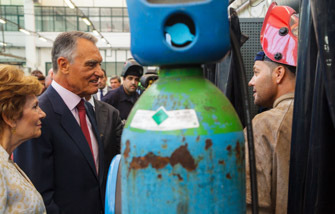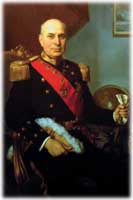
 Américo de Deus Rodrigues Tomás
Américo de Deus Rodrigues Tomás
Born in Lisbon on 19 November 1894, died in Cascais on 18 September 1987.
Son of António Rodrigues Tomás and Maria da Assumpção Marques Tomás.
1922, married Gertrudes Rodrigues. They had two daughters.
ACADEMIC CAREER
Joined Liceu da Lapa in 1904 and completed his secondary education in 1911. Attended the Science Faculty for two years between 1912 and 1914.
OFFICES HELD PRIOR TO THE PRESIDENCY OF THE REPUBLIC
He began his career in 1914 as a midshipman in the Navy. In 1916, having ended his Naval College course during World War I, he worked on escort duty for convoys travelling to England and the north of France, first on the cruiser Vasco da Gama, then on the cruiser Pedro Nunes and also on the destroyers Douro and Tejo.
During this period he was also in charge of the launch Janeiro whose mission was to protect fishing vessels operating on the high seas.
In 1918 he was promoted to first lieutenant and served as chief officer on board the destroyer Tejo.
On 3 October 1919 he was appointed to the III Directorate General of the Navy Ministry.
On 17 March 1920 he began duties on the hydrographical ship 5 de Outubro, on which he served 16 years, having been appointed acting commander in 1924. He became full commander in 1931, with the duties of head of the Hydrographical Mission of the Portuguese Coast. Between 1924 and 1936 he was also a member of the Technical Committee of Hydrographics, Navigation and Nautical Meteorology and of the Council of Oceanographic and Fisheries Studies.
In 1932 he was the expert appointed to serve on the International Council for the Exploration of the Sea. In 1936 he was appointed chef de cabinet of the Navy minister.
Between 1936 and 1939 he served as member of the Central Fisheries Commission, member of the commission appointed to study the change in the Naval Aviation Centre and assistant to the chairman of the Geographical and Research Missions Board of the Overseas Ministry.
In 1940, when he attended the Naval War Course he was promoted to captain, and stood as chairman of the National Board of the Merchant Navy.
Between 1941 and 1944 he was a member of the Naval Officers’ Promotions Board.
In 1944 he was appointed Navy Minister, a position he held until 1958. Whilst minister he sought to rehabilitate the navy with support from NATO and furthered the development of the Merchant Navy.
ELECTIONS TO THE PRESIDENCY OF THE REPUBLIC
In 1958 he was designated as the União Nacional candidate to fight the elections against General Humberto Delgado, the opposition candidate, as Arlindo Vicente, the PCP candidate, had withdrawn his candidacy following the "Cacilhas Pact".
On 8 June 1958, during the elections, a decree-law was published forbidding the opposition from inspecting how the voting halls functioned. The official numbers supplied by the Government merely gave 24% on mainland Portugal and the islands, 31,7% in Angola and 30% in Mozambique to General Delgado. The official totals gave about 75% of the votes cast to Américo Tomás and 25% to General Humberto Delgado, corresponding to 758 998 votes and 236 528 votes, respectively, for each candidate.
Américo Tomás, the União Nacional candidate, was elected.
On 29 August 1959 the constitutional text was altered by Law nº 2100.
The Law established that the highest authority in the land should be elected by a restricted electoral college of 602 members. These consist of Members of Parliament, members of the Corporative Chamber, representatives of the administrative structures of the overseas territories and representatives of the local municipalities. The Electoral College came about as a result of the 1958 elections. It was set up to avoid difficult situations for the regime, such as the opposition candidate being elected.
Américo Tomás was re-elected in 1965 and in 1972 by the Electoral College.
He occupied this position from 9 August 1958 to 25 April 1974, when he was dismissed.
MAIN WORKS PUBLISHED
Sem Espírito Marítimo Não É Possível o Progresso da Marinha Mercante, Lisbon, s.e., 1956.
Renovação e Expansão da Frota Mercante Nacional, preface by Jerónimo Henriques Jorge, Lisbon, s.e., 1958.
Citações, Lisbon, República, 1975.
Últimas Décadas de Portugal, 1st and 2nd vols., Lisbon, Fernando Pereira, 1980 and 1981.
This figure of State had a curious personality.
He began his career in the Navy.
During the early years of his career he contributed to greater knowledge of the Portuguese coast. As the years went by he began to see the need to refurbish the Navy. The ships were old, technologically outdated and insufficient in quantity, thus incapable of any kind of response in emergency situations.
The Navy began to evolve after the 30s. It grew in terms of effectiveness, and achieved a certain quality, having no great ambitions of quantity. However, its plans were more concrete and easier to achieve than those presented by the Army. Américo Tomás reached leadership positions.
Appointed to head the Navy he used his experience to develop it. He is famous for his Decision (Despacho) 100 in which he defined a plan to renovate the Merchant Navy whilst enhancing the shipbuilding industry.
By increasing shipbuilding he made it possible to see an upsurge in the number of shipping lines between the Overseas territories and Mainland Portugal, which began to run regularly and this in turn encouraged and made it possible for domestic and foreign trade to flourish.
It was not only the Merchant Navy that developed. As mentioned above, the Navy embarked on a grand modernisation programme, in particular with regard to shipbuilding facilities and the preparation of technicians, first with help from England and then from the United States. This programme speeded up following Portugal’s entry into NATO (North Atlantic Treaty Organisation) in 1949.
There is no doubt that much in this vast programme is owed to Américo Tomás. His actions were positive given their practical results and effectiveness, despite the fact that many measures were strongly contested by various sectors of Portuguese life, in particular possible preferential connections to politicians and economists regarding the attributions of operating prerogatives.
Whilst his actions in the Navy were positive, as President of the Republic he was careful always scrupulously to perform the duties attributed by the Constitution. He assumed a moderating attitude, became a guardian of institutions, and generally kept a low profile in his activities to the benefit of the Government and the President of the Council.
Selected by União Nacional in 1958 to take over from President Craveiro Lopes, he represented the balance in the succession of the various arms of the Armed Forces and the continued support they had always given the regime of the New State. He stood against General Humberto Delgado in the elections. Contrary to previous presidential elections the opposition candidate did not withdraw his candidacy and if elected threatened to dismiss the head of Government.
Of course the elections were won by the official candidate but the regime had been severely frightened. These elections had polarized popular discontent. The nature of the electoral act had to be changed to avoid similar situations in the future.
So, by Law nº 2100, of 29 August 1959, the President of the Republic would in future be elected by a restricted electoral college.
This electoral college elected the President of the Republic by indirect suffrage on 25 July 1965. Américo Tomás, the official candidate, was “elected” by an overwhelming majority without opposition. He was re-elected for a second term on 25 July 1972, a term which should have continued to 1979.
He was President during the troubled 60s and the start of the 70s.
There was only one situation which forced him to act and to make use of his presidential prerogatives: replacing Oliveira Salazar and appointing Marcelo Caetano in his place.
He was never very pleased with the choice of Marcelo Caetano. The new President of the Council was too reformist. Américo Tomás was concerned with the future of the overseas territories and considered it essential that they should be maintained and was also aware that on that depended the survival of the regime. He therefore compelled Marcelo Caetano to make an undertaking: not to jeopardise the overseas policy.
Following the 25 April 1974 he was dismissed from office and expelled from the Navy, after which he was imprisoned and taken to the island of Madeira. From there he went into exile in Brazil.
As criminal proceedings had never been brought against him, the then President of the Republic, General Ramalho Eanes, allowed him to return to Portugal in 1980. Although he asked to be re-admitted in the Navy, permission was never granted.
© 2006-2016 Presidency of the Portuguese Republic
You have gained access to the records of the Official Site of the Presidency of the Republic from 9 March 2006 to 9 March 2016.
The contents available here were entered in the site during the 10 year period covering the two mandates of President of the Republic Aníbal Cavaco Silva.